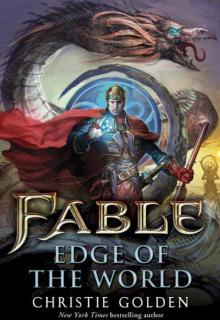- Home
- Christie Golden
Assassin's Creed: Heresy Page 3
Assassin's Creed: Heresy Read online
Page 3
“Always,” Simon replied. “Poole, this is Dr. Victoria Bibeau, from the Aerie in the States. She’ll be staying with us a week.”
Poole’s eyes sparkled. “A pleasure, Doctor. No doubt if you’re working with Professor Hathaway, we’ll be seeing a lot of you here at Temp’s.”
“I’m getting that impression,” Bibeau replied.
“Will you be traveling outside of London? The leaves are turning.”
“Sadly, no, all business here in the city, I’m afraid.”
“Too bad. Make sure you drop in for an afternoon tea—we’ve got pumpkin biscuits and apple spice cake this time of year.”
“I hope we can,” smiled Victoria. “For now, though, I suppose I’ll have the usual, too.”
“Two racks of toast and rashers of bacon,” Poole said, nodded, and headed toward the kitchen. As Bibeau poured milk into her tea, Simon decided to get right to the point.
“So, Dr. Bibeau… why you?”
She took a sip before replying. “I have extensive experience helping to integrate first-time users of the Animus,” she said.
“Yes, I read about your work at Abstergo Entertainment and in the Aerie,” he said. The Aerie was a unique facility currently devoted to training a small, specific group of young adults. They were unique in that their genetic memories were more important—and valuable—together than separately. “I’ve not seen the teenage years for some time, Doctor.”
“Please, call me Victoria,” she said. “And I’m quite aware of that. I had a case at Abstergo Entertainment that… well, it was life-changing in several ways, both good and bad. The bottom line is there are few in the Order who know more about what interaction with the Animus can do to the human brain than I. I don’t know if you’ve spoken with Dr. Kilkerman yet, but the model you’ll be using is a new one—a prototype, really.”
He bristled. “Yes, naturally I have spoken with Dr. Kilkerman, and I understand it’s an improvement.”
“Even so—you’re a first timer, you have only a week to do what you need to in order to prove the value of your approach, and you’ll be spending a lot of time in it. Quite simply, you need me, Simon.”
Poole arrived with their toast and bacon. Simon sipped his tea for a moment, then said, “Clearly, you’ve read about me and my own work.”
“Oh yes,” Victoria said. “I will be very interested in learning about your ideas as we work together. And before you say it, I also read all your psychological evaluations and find you remarkably stable. I don’t anticipate many problems.”
“I don’t anticipate any.”
She showed prominent white front teeth in a genuine smile. “Well, then, commençons.”
“I don’t speak French, I’m afraid.”
“You might in two weeks. Well,” she amended, “whatever was spoken in the fifteenth century.”
“That would be Middle French… pardon?”
“Are you familiar with the Bleeding Effect?”
“Ah… of course.” The Bleeding Effect was a possible side effect of spending time in the Animus. On occasion, the personality, thoughts, emotions, and sometimes physical abilities from one’s ancestor “bled” into the subject. “I’m already fluent in Russian, Spanish, and Arabic, but I can’t imagine where Middle French would come in handy.”
“Could be fun at a party,” she said, grinning, then added more seriously, “but honestly, it wouldn’t be immediate, and I doubt you’ll be anywhere near fluent. Sometimes, a Bleeding Effect can be positive. Learning a new skill, like martial arts, or a language. But I’d be remiss if I didn’t mention the potential it has to be extremely dangerous. I’m sure you’re familiar with Subjects 4 and 14, and the devastating result the Bleeding effect had on them. But I, unfortunately, had a chance to observe it personally.”
Her eyes were somber and her voice quiet as she spoke. “One of our research analysts at Abstergo Entertainment got far too caught up in his subject. Eventually, he became convinced that he was the reincarnation of an Assassin named Arno Dorian, who was active during the French Revolution.”
“Not the nicest time in history, certainly,” Simon said. “What happened?”
“He attempted to sabotage the project. He destroyed priceless research—deleted files, smashed hard drives, burned his notes. The Order tried to contain him, but he resisted.” Her lips pressed together.
Simon understood what that meant. “Ah, I see. That’s too bad. All that research—just gone. Were you able to recover any of it?”
She gave him an expression he couldn’t fathom. “Some,” she said. “Anyway, it’s my understanding that most of the problems we’ve experienced in the Animus have been virtually eliminated. That’s the goal, at least. Which means that the main concern is the Bleeding Effect. As long as people are people, I do not think we will ever fully conquer that one.”
While they finished their breakfast, Victoria questioned Simon about his hobbies. He demurred at first, saying, “I’m a Templar, we don’t have hobbies,” but she revealed that she herself enjoyed pottery and running marathons. “Not at the same time, though.” She smiled her wide, toothy grin. “They help me get out of my head and into my body for a while. You must have something you enjoy doing.”
Simon admitted that he had a fondness for the ocean. “Sailing?” Victoria asked.
“Diving, actually,” he said. “Shipwrecks.” He paused. “And hidden passageways. There’s loads of them in London.”
She looked at him with new respect. “There’s more to you than meets the eye, Simon Hathaway.”
He thought about it and sighed. “Actually, no, I think I’m about as dull as one would expect.” He steered the direction back to their task, elaborating on what he was trying to accomplish and outlining the sword’s history. “If your analyst was researching Arno Dorian, you may have even seen the sword we’ll be investigating. François-Thomas Germain owned it for a while, till Dorian, ah, dispatched him.”
He pulled out his tablet from his briefcase and sent her some of his notes, which included a list of incidents in Joan’s life that would be the most productive for them to explore through his ancestor’s memories. Victoria said this would be of great help in working up an algorithm, to make the best use of their Animus time.
“How much do you know about this time period?” he inquired, flagging Poole down for another pot of tea.
“Not much, I’m afraid. I was pulled onto this project less than twenty-four hours ago. I find that I don’t have to be a good historian to be of help to research analysts, but I think an understanding of the basics would be beneficial.”
Simon hid his annoyance. Although he was technically a professor he found teaching frustrating, and wasn’t looking forward to walking Victoria through step by step. “Well,” he said with false cheer, “let’s see if we can get through everything on this fresh pot of tea.
“In 1428, when Joan of Arc stepped onto history’s stage, the whole concept of who France’s “rightful king” was, as was so often the case, muddied by politics, armies, marriages, and inconvenient deaths. The Hundred Years’ War—which actually lasted a hundred and sixteen—had been raging for over ninety of them by this time. King Henry V, made famous by Shakespeare, had died six years previously at age thirty-five, not in glorious battle, but ignominiously felled by dysentery, a disease that was no respecter of the difference between kings and commoners. King Charles VI of France, who had gone down in history both as “the Beloved,” which it seemed he had been, and “the Mad,” which he most definitely had been, had survived his English rival by a mere two months.
“Joan’s Dauphin, the future Charles VII, was actually the fourth of his father’s sons to be named heir to the throne. He never expected to become king, and was wretchedly insecure about it. That wasn’t helped by rumors spread by the English and Burgundians—those were the French who followed Philip of Burgundy and joined with the English—”
“Oui,” Victoria interrupted, her eyes twinkling. �
��I think I do know about Burgundians.”
“Oh, of course, right. Sorry. Back to it. Charles’s mother, Isabeau of Bavaria, was accused of taking lovers—including her husband’s brother, so Charles’s legitimacy was in question.”
“Was she really his mother?”
“We think so. He’s definitely recorded as having the Valois nose.”
The topic turned to Simon’s new approach for the department. While much of what he shared was a recap of his presentation to the Inner Sanctum the previous day, he added something he hadn’t volunteered there.
“Joan of Arc had at least three swords that we knew about,” he said. “So it’s not going to be quite the walk in the park we could wish for.”
“So, you fudged a little to Rikkin?”
“The merest trifle,” he insisted. “I have a hunch which one it might be. I’m still quite keen on seeing what turns up along the way. The sword, for me, is only part of it.”
By the time they’d finished the meal, Simon was resigned to Victoria’s presence throughout this phase. If he had to have a nanny holding his hand while he poked through the past, he supposed that she was a tolerable choice.
The direct lift down to the bowels of the London offices—including the rooms where Simon had been inducted into the Order and given the Inner Sanctum his presentation—could only be accessed by certain floors. This was not one of them. They would have to ride back up to Historical Research, then transition to the lift. They left Temp’s and stood in slightly awkward silence as the numbers lit up, indicating the lift’s arrival. The doors slid open and Simon found himself standing face to face with a petite young woman who had a rebellious cherry-red streak in her otherwise black, shoulder-length tresses.
Her brown eyes widened slightly. “Simon,” she said, “Lovely to see you. It’s been a while.”
“Yes, it has,” he said. “Anaya, this is Dr. Victoria Bibeau. She’s here for a couple of weeks to help me muddle through some things up in Historical Research. Victoria, this is Anaya Chodary. She used to be a field agent, but now she’s one of our best White Hats.”
For a moment, Victoria looked puzzled, then understanding dawned. “An ethical hacker,” she said.
“Some people think it’s a contradiction in terms, but I like the name,” Anaya said as she and Victoria shook hands.
“Your contribution cannot be overestimated. I am certain you have spared Abstergo a multitude of disasters.”
“Thank you,” Anaya said, “I try my best. I know Simon’s always in a hurry, so I’ll not keep you two.” Her eyes wandered back to Simon’s. “I’m glad I ran into you. I found your jumper the other day. The blue one you thought you’d lost.”
Simon drew a blank, then remembered. “Oh! Right.”
“Shall I run it ‘round for you?”
“Oh, no, don’t bother. Take it to the Oxfam shop or something. I’ve far more than I’ll ever wear.” He stepped into the lift, nodding to her as the door closed. “Cheers.”
He punched the button and the lift ascended with a gentle whir. Victoria was quiet for a moment, then she asked, “What happened between you two?”
Simon threw her a glance. “If you must know, nothing terribly exciting. Just the usual things. Work, responsibilities, so forth. I don’t have to tell you what being a Templar asks of one.”
“Especially a Master Templar and a member of the Inner Sanctum.”
He was taken aback. “Know all that, do you?”
“It… was deemed a good thing for me to know, yes. And yet, Templars do manage to have spouses and families.”
“I don’t. And I recall from your file that you are not among that happy few.”
He had thought she’d bridle at the remark, but instead she laughed. “Touché, Simon.”
CHAPTER
THREE
The Animus was located several stories belowground. Security at Abstergo was always a top priority. Everything from the obvious measure of key cards hung about one’s neck to the unseen army of ethical hackers, of which the ferociously intelligent Anaya was a brigadier, ensured that constant vigil was kept on Abstergo’s physical and technical security.
The lift opened onto a spacious two-story room. On all four sides were three-dimensional monitors, with white-coated technicians seated in front of them. Out of the corner of his eye, Simon glimpsed myriad scenes of tiny, three-dimensional images of people playing out their inevitable destinies while they were analyzed and cataloged. Elsewhere in the room priceless antiquities were on stately display. Centuries-old relics softened the gray concrete and chrome of the walls; swords, small statues of Egyptian, Greek, and Roman gods, banners, shields, chalices, and horns filled elegant display cases.
But it was the Animus that commanded his attention, and he obeyed, staring at the machine with pale blue eyes gone wide behind his spectacles.
He understood now what Rikkin had meant when he said it wasn’t really a “chair” anymore. Gleaming and perfect—as of course it would be—this Animus would not seat its occupants. It would embrace them.
An exquisite amalgamation of technology and unsettling, accidental art, the jointed frame hung suspended from the ceiling, looking like a metallic human skeleton—if human skeletons had been modeled on those of snakes. It had a spine, arms, legs, everything but a head, but Simon suspected a separate helmet served that function. A large metal ring would keep the occupant standing erect, and there were a variety of extremely secure-looking straps to keep said occupant in place.
They had attracted the attention of Amanda Sekibo, who headed over to greet them. “Professor Hathaway, Dr. Bibeau,” she said, “welcome to the Animus Room. So, Professor—what do you think of our new model?”
“It looks a bit like something the Inquisition might have used back in the day, doesn’t it?”
Victoria stepped in quickly at Sekibo’s expression. “It’s actually much more sophisticated than the Aerie’s Animus. You should have few, if any, headaches, and probably no vomiting at all.”
“Lovely,” Simon said.
“I’m hoping I’ll be able to tell the kids they can have an Animus like this one soon.” To Sekibo, she said, “Would you mind familiarizing me with the controls?”
“Of course, Doctor.”
“Please, call me Victoria.” Simon wondered if she let anybody call her by her last name. He tagged along, tuning them out when they delved into too-technical jargon and listening politely when they went over things he already knew. If he’d been sitting at a desk, his fingers would have been drumming on it. After what felt like a century, Victoria thanked Sekibo. The young woman went to her team and gently tapped them on the shoulders. They closed down their stations, the miniature avatars disappearing, and quietly entered the lift.
Simon and Victoria were alone. “Are you ready?” Victoria asked.
“For the Iron Maiden over there?”
“Oh, I wouldn’t call it that,” she said. “I don’t think you appreciate how superior it is to the older models. This one’s the Animus 4.35, derived from the technology Abstergo developed for the 4.3—the one currently in use in Madrid. I understand that while the Madrid one’s more immersive, it’s also supposed to be quite a lot more invasive. For instance, I won’t have to perform a spinal tap on the 4.35.”
“Oh. I see.” He took a deep breath. “Well… as Joan of Arc herself is reputed to have said, better now than tomorrow.”
They walked over to the apparatus. Simon stepped onto the two-part platform, shrugging into a harness that looked too light to be as durable as it was while Victoria fastened the large metal ring about his narrow waist. Gingerly, he put his weight on one foot, than the other. The platforms responded smoothly, like an advanced stair climber or elliptical machine.
“There’s the potential for piece of brilliant exercise equipment here, you know,” he deadpanned.
She laughed. “You don’t know the half of it,” she said. I should put a Bodyband on you to keep track of your step
s.” She continued fastening straps and clicking things into place as she spoke. “You’ll have complete freedom of movement. In fact, the harness and the exoskeleton will support your body as it moves the same way your ancestor did. Remember, this won’t be a minute-to-minute encapsulation of your ancestor’s life. The time period is three to four years, but we only have one week.”
We. Her casual insertion of herself into the project vexed Simon, but he brushed it aside. She would be supervising him the entire time, and likely debriefing him. He’d known he would require an assistant, but she was shaping up to be a partner.
Simon knew he did not play well with others, but there was no getting around it. Victoria double-checked all the fastenings and nodded in approval, and Simon realized just how vulnerable he was. Maybe he would be glad of a partner after all.
“Erm,” he said, tugging slightly on one of the restraints, “What’s the backup if you suddenly have a massive heart attack at your station?”
She laughed, a bright, free sound, and he smiled a little. “An alarm would sound, the doors would unlock, and the medical team would be here in seconds. Eventually someone would get around to letting you out.”
“Brilliant.”
“Abstergo is adamant that a subject must always be monitored. Now, if you’d be willing to risk severe injury, you might be able to leave the last back strap undone and get in by yourself.” Her toothy smile dimmed. “I do not recommend it. One of the kids I work with uses the Animus to escape his own genuine paralysis.”
“Oh. Quite. Well—are we all set?”
“All but the helmet,” Victoria replied. “I’ll place it on, and then we’ll be able to communicate through it.” She stepped behind him and lowered it over his blond head. The thing was almost like a sensory deprivation chamber, utterly black and sound-canceling. It was a peculiar sensation, and Simon actually started when he heard Victoria’s voice in his ear. It was almost as if it was coming from inside his head.

 Rise of the Horde
Rise of the Horde World of Warcraft: War Crimes
World of Warcraft: War Crimes Fable: Edge of the World
Fable: Edge of the World Homecoming
Homecoming StarCraft II: Devil's Due
StarCraft II: Devil's Due Starcraft II: Flashpoint
Starcraft II: Flashpoint Allies
Allies Shadow Hunters
Shadow Hunters The Shattering: Prelude to Cataclysm wowct-1
The Shattering: Prelude to Cataclysm wowct-1 STAR TREK: VOY - Homecoming, Book Two - The Farther Shore
STAR TREK: VOY - Homecoming, Book Two - The Farther Shore King's Man and Thief
King's Man and Thief In Stone's Clasp
In Stone's Clasp Jaina Proudmoore: Tides of War
Jaina Proudmoore: Tides of War Vampire of the Mists
Vampire of the Mists Star Wars: Fate of the Jedi II: Omen
Star Wars: Fate of the Jedi II: Omen King's man and thief cov-2
King's man and thief cov-2 Star Trek
Star Trek StarCraft: Dark Templar: Twilight
StarCraft: Dark Templar: Twilight Lord Of The Clans
Lord Of The Clans ARKTIKA.1 (Short Story)
ARKTIKA.1 (Short Story) Before the Storm
Before the Storm STAR TREK: VOY - Homecoming, Book One
STAR TREK: VOY - Homecoming, Book One Shadow of Heaven
Shadow of Heaven Before the Storm (World of Warcraft)
Before the Storm (World of Warcraft) Warcraft Official Movie Novelization
Warcraft Official Movie Novelization Flashpoint
Flashpoint STAR TREK: The Original Series - The Last Roundup
STAR TREK: The Original Series - The Last Roundup On Fire’s Wings
On Fire’s Wings Spirit Walk, Book One
Spirit Walk, Book One Thrall Twilight of the Aspects
Thrall Twilight of the Aspects Valerian and the City of a Thousand Planets
Valerian and the City of a Thousand Planets Warcraft
Warcraft Assassin's Creed: Heresy
Assassin's Creed: Heresy Dance of the Dead
Dance of the Dead Arthas: Rise of the Lich King wow-6
Arthas: Rise of the Lich King wow-6 Assassin's Creed: The Official Movie Novelization
Assassin's Creed: The Official Movie Novelization Rise of the Horde wow-2
Rise of the Horde wow-2 Dark Disciple
Dark Disciple Ghost Dance
Ghost Dance The Shattering
The Shattering Spirit Walk, Book Two
Spirit Walk, Book Two Star Wars: Fate of the Jedi: Ascension
Star Wars: Fate of the Jedi: Ascension Star Wars: Fate of the Jedi V: Allies
Star Wars: Fate of the Jedi V: Allies The Enemy Within
The Enemy Within Kindred Spirits
Kindred Spirits The Farther Shore
The Farther Shore Star Trek: Hard Crash (Star Trek: Starfleet Corps of Engineers Book 3)
Star Trek: Hard Crash (Star Trek: Starfleet Corps of Engineers Book 3) Twilight
Twilight